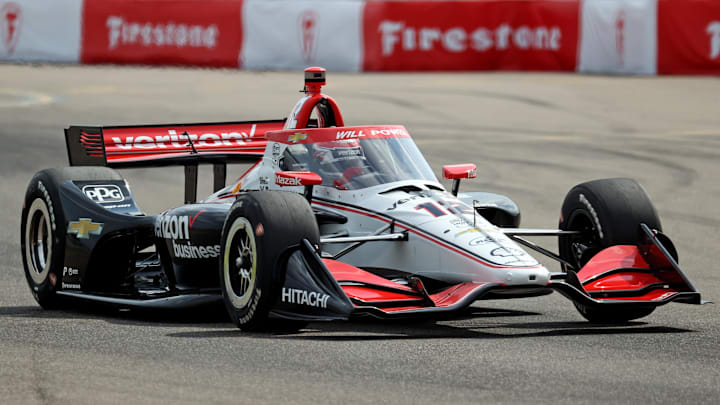The Team Penske push-to-pass scandal from the 2024 IndyCar season opener on the streets of St. Petersburg, Florida, even after taking six weeks to discover ahead of the second event on the streets of Long Beach, California, has rocked the IndyCar world this week.
For the first time in nearly three decades, a race winner was disqualified, and it didn't happen until 45 days after the event.
For the record, it took less time for Tom Brady to unretire. But I guess that's what happens when a season's first two races are a month and a half apart. I digress.
Team Penske disqualifications shock IndyCar world
Original St. Petersburg winner Josef Newgarden and third place finisher Scott McLaughlin were both disqualified from the event, handing the win to Arrow McLaren's Pato O'Ward, his first in the series since July 2022 when he won at Iowa Speedway.
The only point still credited to Newgarden or McLaughlin from the opening weekend is Newgarden's point for taking the pole position.
Both Newgarden and McLaughlin were confirmed to have illegally used the push-to-pass button during a start and/or restart to gain an advantage over the competition, prompting their disqualifications.
Anything and everything beyond that -- intent, prior knowledge, since when this would have been possible, what would have happened if the loophole wasn't discovered, etc. -- remains speculation, and there still far more questions than there are answers.
But it wasn't just Newgarden and McLaughlin who were penalized. Penalties, which also included $25,000 fines and the forfeiture of prize money associated with the event, were handed down to all three Team Penske entries.
Even Will Power was docked 10 points, despite the fact that his fourth place finish turned into a second when his teammates were disqualified.
It was not just an entrant penalty either; his point total in the driver championship standings took a 10-point hit.
Power was never accused by IndyCar of illegally manipulating the system, and Team Penske's statement on the matter confirmed that his two teammates did indeed do something they should not have, whereas he did not.
Newgarden has yet to comment on the matter, but that is expected to change in a Friday morning news conference. McLaughlin released a statement admitting his rules violation (to an extent), and Power released a statement denying any wrongdoing.
— Will Power (@12WillPower) April 25, 2024
For Power, quite frankly, that was more than what was necessary, considering his innocence.
So why should Power have been penalized at all if he didn't take advantage of the breach?
Aside from IndyCar simply cracking down on the entire team -- and embarrassingly, the series owner's team, no less -- and making a major statement with the biggest penalty of any kind in decades, there could have been long-term ramifications here where a Team Penske driver effectively benefitted from his own team's infraction.
IndyCar has not confirmed that this played a role in Power's penalty, but it would not be hard to justify it if it did. This seems to be about something more than Power simply getting caught in the crossfire.
Power scored 32 points with his original fourth place finish and moved up to second, which pays 40. That's an eight-point gain.
Let's envision a scenario where the entire season plays out, and based on original race results, Chip Ganassi Racing's Alex Palou has scored 540 points while Power has scored 538.
But because Power's teammates were caught doing something they shouldn't have been doing, Power now has 546 points and is the series champion over Palou with 544.
Now Team Penske would have effectively won a championship because they, for lack of a better word, cheated.
Of course, moving every other driver up in the finishing order following the disqualifications to Newgarden and McLaughlin also alters the standings. Some drivers gained more points than others (for example, O'Ward gained 10 points with his move from second to first place, while Andretti Global's Colton Herta gained only five with his move from fifth to third).
There is technically a mathematical a chance that one driver's gain vs. another's could be enough to sway the championship.
But those non-Team Penske drivers have nothing to do with this situation. At that point, you have to chalk it up to collateral damage for some and right place, right time for others.
However, should the Team Penske infraction effectively have ended up robbing another team of the championship and given it to Team Penske, even though the Team Penske driver in question is innocent, this scenario would be an even greater black eye on the sport than it already is.
At the end of the day, while it was a 10-point penalty issued to Power, it was really only a two-point deduction anyway, thanks to his move from fourth to second place. You could really argue it should have been just an eight-point penalty to ensure no changes in the standings.
But either way, series officials made sure that Team Penske had absolutely no roundabout way of backing into any kind of benefit here. Even if that wasn't the intention, it was clearly the right call.
